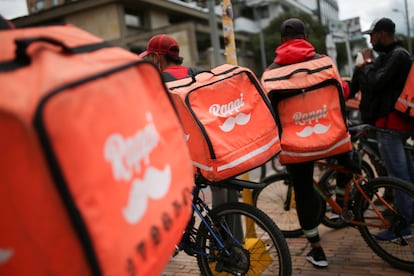The worst may be over in the Silicon Valley Bank collapse but Latin American startups face challenges ahead
Technology companies in the region will find it harder to get financial services and raise capital after the demise of the niche bank

“An entrepreneur I know just told me she can finally sleep peacefully,” said Daniel Bilbao, the Colombian founder of Truora, one of the hundreds of Latin American startup companies with deposits in Silicon Valley Bank (SVB). US authorities were forced to shut down the country’s sixteenth-largest bank in early March after its investment strategy failed. When U.S. President Joe Biden later assured anxious SVB clients that all deposits ($175 billion) would be insured by the government, many corporate directors in Latin America breathed a sigh of relief.
The region’s three largest startups – Brazil’s C6 bank, Colombia’s Rappi and Mexico’s Kavak – told EL PAÍS they were unaffected by SVB’s collapse as they had no deposits and no shares in the failed bank. Beek, a Mexican audiobook company, told us they managed to withdraw their funds from SVB just before the collapse. Bilbao said he moved his company’s funds to another bank the day before SVB fell. But dozens of other companies in Latin America may not have fared as well.
This is the third major panic for 39-year-old Daniel Bilbao’s generation of tech entrepreneurs. First came the 2020 pandemic. “I thought we were all going to go bankrupt, but it turned out to be a boom driven by widespread digitalization.” Then came last year’s market crash, which shuttered startups without viable business models, caused share prices to dive and dried up investment capital. According to CB Insight, funding for financial technology (fintech) companies based in Latin America and the Caribbean fell 71%, from a peak of $13.9 billion in 2021 to $4 billion in 2022. This was the period’s most significant drop in fintech funding for any region worldwide.
The SVB collapse was the third major blow because the bank catered to technology companies. For many Latin American startups, it was the only bank to let them open accounts when they were just getting going. But Latin Americans are used to crises, which may be a competitive advantage. “The 1999-2000 crisis in Colombia was the worst I have ever experienced. Classmates were sent to schools abroad, companies left the country, and there were many kidnappings,” said Bilbao. “With all due respect, Latin America crises are much tougher than gringo ones, by far. I think that’s why Latin American entrepreneurs have more callouses.”
This is the sentiment shared by Alexander Torrenegra, CEO of Torre, a technology company backed by funding from Apple and SpaceX. He had personal savings, a mortgage and resources from several companies in SVB. Torrenegra tweeted, “I have friends whose parents lost everything in bank runs in Latin America. As such, when I learned that a bank run had started hours ago, I did what I considered essential to safeguard the salary of my employees, the saving of my family, and the future of my bootstrapped company. Now, my thoughts are with the thousands of hard-working employees at Silicon Valley Bank that will be out of a job soon, their equity wiped because of misjudgments made by their bosses. It’s been a week of extreme anxiety and uncertainty for me and many others. If you were also affected, please stay strong, persist, and hug your loved ones. You’ll recover.”
My tweet got a lot of traction. I migrated to the US from Colombia, South America, with almost nothing. I have friends whose parents lost everything in bank runs in Latin America. As such, when I learned that a bank run had started hours ago, I did what I considered essential to… https://t.co/8pfk0IvRD9
— Alexander Torrenegra (@torrenegra) March 13, 2023
The winners from all this will be the big investment banks. Beek and Truora opened accounts at Wall Street giant JPMorgan with the funds they withdrew from SVB. Small companies will find it harder to grow since larger banks have more requirements for doing business. Credit rating firm Moody’s warned on March 13 that it is considering a downgrade of six other US banks after SVB’s collapse. This exacerbates harsh financial conditions for the technology sector, which is already under pressure from the global rise in interest rates.
“Entrepreneurship is objectively more difficult now than two years ago,” said Bilbao. “Having a viable startup is tougher because interest rates are higher, so investors choosing between buying treasury bonds or investing in a startup will find the startup less attractive. However, businesses that are excellent at solving problems for customers will not only survive, but they will also prosper and grow. This year and the next will be about survival and growing markets. Whoever succeeds at that will do very well. But the terrain is rockier.”
Sign up for our weekly newsletter to get more English-language news coverage from EL PAÍS USA Edition
Tu suscripción se está usando en otro dispositivo
¿Quieres añadir otro usuario a tu suscripción?
Si continúas leyendo en este dispositivo, no se podrá leer en el otro.
FlechaTu suscripción se está usando en otro dispositivo y solo puedes acceder a EL PAÍS desde un dispositivo a la vez.
Si quieres compartir tu cuenta, cambia tu suscripción a la modalidad Premium, así podrás añadir otro usuario. Cada uno accederá con su propia cuenta de email, lo que os permitirá personalizar vuestra experiencia en EL PAÍS.
¿Tienes una suscripción de empresa? Accede aquí para contratar más cuentas.
En el caso de no saber quién está usando tu cuenta, te recomendamos cambiar tu contraseña aquí.
Si decides continuar compartiendo tu cuenta, este mensaje se mostrará en tu dispositivo y en el de la otra persona que está usando tu cuenta de forma indefinida, afectando a tu experiencia de lectura. Puedes consultar aquí los términos y condiciones de la suscripción digital.









































